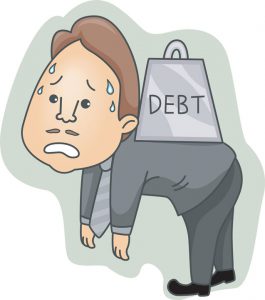Debt Reduction
You must show that you have tried to reduce your debt before you can apply for any kind of bankruptcy.
Self-Help for Debt Reduction
 Developing a Budget – make list for each category
Developing a Budget – make list for each category
Determine income – assessment of how much money you take in and how much money you spend. List your income from all sources.
Determine Fixed expenses – Bills that are the same each month, mortgage payments or rent, car payments, and insurance premiums.
Determine other expenses – groceries, entertainment, and clothing. A helpful way to track your spending patterns is to list all your expenses, even those that seem insignificant, identify necessary expenses, and prioritize the rest.
Determine your basic needs – The goal is to make sure you can make ends meet on the basics: housing, food, health care, insurance, and education. Computer software programs can be useful tools are available for developing and maintaining a budget, balancing your checkbook, and creating plans to save money and pay down your debt.
You can also find information about budgeting online, at your public library, and in bookstores.
Contacting Your Creditors
Contact your creditors immediately if you are having trouble! Do not wait until your accounts are given to debt collectors. (This means that creditors have given up on you at this point.) Tell them your difficulties, and try to work out a modified payment plan that reduces your payments to a more manageable level.
Dealing with Debt Collectors
Federal law dictates how and when a debt collector may contact you: not before 8 a.m., after 9 p.m., or while you are at work. (If they have been notified that your employer doesn’t approve of the calls) They must honor a written request from you to stop further contact.
 Help for Debt Reduction
Help for Debt Reduction
Debt Reduction Counseling can help with this process – Sometimes having an outside source is helpful.
Credit Counseling
Reputable credit counseling organizations can advise you on managing your money and debts, help you develop a budget, and offer free educational materials and workshops. Counselors need to be certified and trained in consumer credit, money, and debt management, and budgeting. Reputable credit counseling organizations still can help you create a budget and teach you money management skills. Counselors can help you create a personalized plan to solve your money problems while discussing your entire financial situation. Most reputable credit counselors are non-profits and offer services through local offices, online, or on the phone.
Debt Management Plans – If your financial problems stem from too much debt or your inability to repay your debts, a credit-counseling agency may recommend that you enroll in a debt management plan (DMP). A DMP alone is not credit counseling.
Debt Settlement Programs – Reputable debt settlement programs are offered by for-profit companies. They negotiate with your creditors to allow you to pay a “settlement” to resolve your debt. A lump sum that is less than the full amount that you owe. To make that lump sum payment, the program asks that you set aside a specific amount of money every month in savings.
You must get credit counseling from a government-approved organization within six months before you file for any bankruptcy relief.